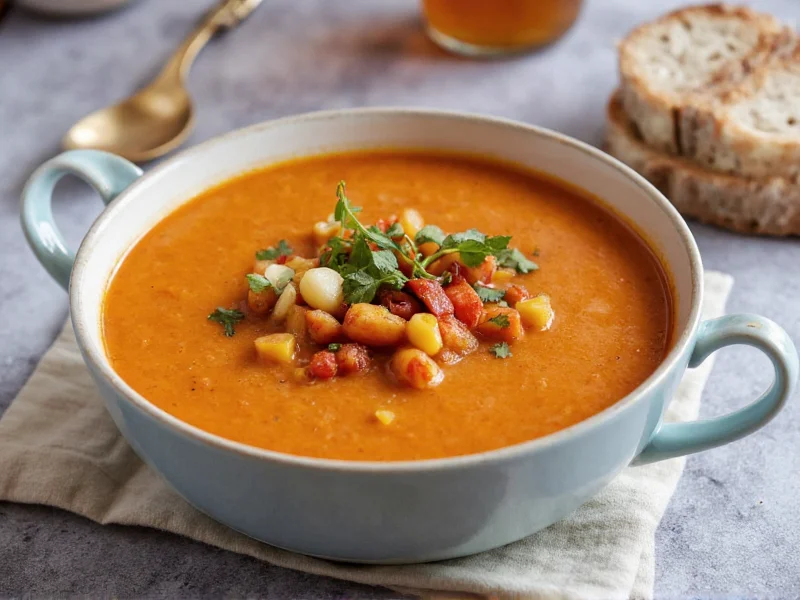When temperatures drop, nothing satisfies like a steaming bowl of perfectly crafted winter soup. The science behind winter's best soups lies in their ability to provide both physical warmth and nutritional density. Unlike lighter broths preferred in warmer months, ideal cold-weather soups contain higher concentrations of complex carbohydrates, healthy fats, and warming spices that increase circulation and provide sustained energy.
Why Certain Soups Excel During Winter Months
Winter's unique climate demands specific culinary adaptations. The body requires more calories to maintain core temperature, making nutrient-dense soups particularly valuable. Research shows that consuming warm, liquid-based meals increases feelings of fullness while requiring less energy for digestion compared to cold foods. This thermogenic effect makes hearty vegetable soup for winter not just comforting but physiologically advantageous.
Top Winter Soup Varieties Compared
| Soup Type | Key Ingredients | Preparation Time | Notable Health Benefits |
|---|---|---|---|
| Root Vegetable Stew | Carrots, parsnips, turnips, celery root | 60-75 minutes | Rich in vitamins A and C, supports immune function |
| Hearty Lentil Soup | Green lentils, kale, tomatoes, garlic | 45-60 minutes | High in plant-based protein and iron |
| Winter Squash Bisque | Butternut squash, apples, ginger, coconut milk | 50-65 minutes | Abundant in beta-carotene and anti-inflammatory compounds |
| Beef Bone Broth | Beef bones, marrow, herbs, apple cider vinegar | 12-24 hours | Rich in collagen, supports joint health and digestion |
Essential Ingredients for Authentic Winter Soups
Creating genuinely warming soup recipes for cold days requires understanding seasonal ingredient synergy. Root vegetables like potatoes, sweet potatoes, and beets provide natural sweetness that intensifies when roasted before adding to soup. Winter greens such as kale, collards, and Swiss chard maintain their structure during cooking, adding both texture and nutritional value. Don't overlook the power of warming spices—fresh ginger, turmeric, and cinnamon not only add depth but also stimulate circulation.
For those seeking healthy winter soup recipes with root vegetables, consider the Maillard reaction principle. Browning meats and caramelizing vegetables before adding liquid creates complex flavor compounds that can't be achieved through boiling alone. This technique transforms simple ingredients into deeply satisfying winter soup varieties that feel special without requiring exotic components.
Perfecting Your Winter Soup Technique
The difference between adequate and exceptional winter soups often lies in technique rather than ingredients. Start with cold water when making bone broths to gradually extract collagen and minerals. For cream-based soups, add dairy at the end of cooking to prevent curdling. When preparing easy winter soup preparation techniques, remember that most flavors deepen when soups rest overnight, making them ideal for batch cooking.
Acidity balances richness in hearty winter soups. A splash of apple cider vinegar or lemon juice added just before serving brightens heavy flavors without making the soup taste sour. For optimal texture in vegetable-based winter soups, add delicate greens during the last 5-10 minutes of cooking to preserve both color and nutrient content.
Seasonal Pairing and Storage Wisdom
Complement your winter soup with appropriate sides for complete satisfaction. Crusty whole-grain bread provides the perfect vehicle for dipping while adding complex carbohydrates. A simple green salad with citrus dressing creates a refreshing contrast to rich soups. For beverage pairings, consider warm herbal teas or dry ciders that won't compete with the soup's flavors.
Proper storage ensures your best winter soup recipes for cold weather maintain quality. Cool soups completely before refrigerating to prevent condensation that dilutes flavor. Store in airtight containers for up to 4 days in the refrigerator or freeze in portion-sized containers for up to 3 months. When reheating, add a splash of broth or water to restore ideal consistency, as soups often thicken when stored.
What makes a soup specifically suitable for winter consumption?
Winter soups typically feature hearty ingredients like root vegetables, substantial proteins, and warming spices that provide both physical warmth and nutritional density. They generally have thicker consistencies than summer soups and incorporate seasonal produce that's at its peak during colder months, maximizing both flavor and nutritional value when you need it most.
Which vegetables work best in winter soups?
Root vegetables like potatoes, sweet potatoes, carrots, parsnips, and turnips excel in winter soups due to their natural sweetness and ability to hold structure during cooking. Winter squash varieties including butternut and acorn provide creamy texture, while hardy greens like kale and collards add nutritional value without wilting completely.
How can I make my winter soup more nutritionally balanced?
For optimal nutritional balance, include all three macronutrients: complex carbohydrates from vegetables, healthy fats from olive oil or coconut milk, and protein from beans, lentils, or lean meats. Adding a splash of vinegar or lemon juice at the end enhances mineral absorption from plant-based ingredients while brightening the overall flavor profile.
What's the ideal consistency for winter soups compared to summer versions?
Winter soups generally benefit from thicker consistencies that provide more substantial nourishment. This can be achieved through natural starches from potatoes or beans, reduction techniques that concentrate flavors, or small amounts of thickening agents like pureed vegetables. The ideal winter soup should coat the back of a spoon but still flow slowly, creating a satisfying mouthfeel that provides warmth and comfort.
How long can properly stored winter soup maintain its quality?
When cooled completely and stored in airtight containers, most vegetable-based winter soups maintain optimal quality for 4-5 days in the refrigerator. For longer storage, freeze in portion-sized containers for up to 3 months. Meat-based soups have a slightly shorter refrigerator shelf life of 3-4 days. Always reheat thoroughly to 165°F (74°C) before consuming.











 浙公网安备
33010002000092号
浙公网安备
33010002000092号 浙B2-20120091-4
浙B2-20120091-4